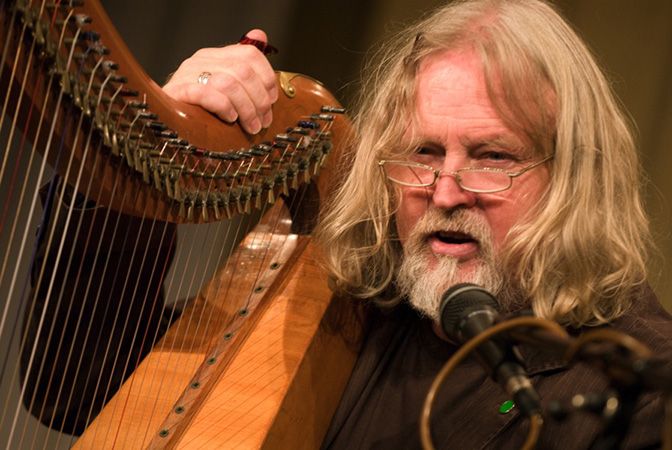At the Congregational Church, Laugharne Festival May 4th
This hour-long event was a pleasing sampler to showcase the gamut of Robin Williamson’s art. There was poetry set to music, storytelling and witty commentary. As homage to Dylan Thomas’s centenary, he kicked off with a harp-accompanied recital of ‘Poem on His Birthday’, singing selected verses after setting the mood with a melancholic Anglesey tune on the theme of death, appropriately as the poem is about moving toward death. ‘Oh, let me midlife mourn by the shrined/ And druid herons’ vows/ The voyage to ruin I must run… And the rhymer in the long tongued room/ Who tolls his birthday bell/ Toils towards the ambush of his wounds’.
Next was ‘Dreams of No Return’, an Incredible String Band song from forty years ago, again about death rather than his more colourful visionary ones (e.g ‘Three is a Green Crown’), ‘Why should you care/ I never saw the tomb you they laid/ There was already too much shade?’
Then the dynamic changed. Robin Williamson got to his feet and entertained us with stories. His grandfather being the only one of five brothers not to go into the Presbyterian church, he was reprimanded by his father one morning for arriving at breakfast late. He had better mend his ways if he was not to end up in the fires of Hell. He replied he had been absorbed in a dream but it would be alright because the dream showed him how many ministers had gone to Hell first, so that he would be shielded from the flames. This was followed by an amusing tale about an Irishman building the docks in Cardiff, telling how he lost an eye when he ignored warnings against lustfulness by the cardinal sent from Rome to bless their work. Then in his traditional bardic mode, he told how the poet Ossian lost his eternal youth and superior strength in an accident helping quarrymen move rocks as he came to the land of Ireland now being catholicized. The legendary crane skin bag of magical powers that had been full at the high tide of Celtic heroism was now empty as the tide of the old legends of ebbed. In conversation with St Patrick, Ossian was told to ‘talk to me of something other.’ The point seemed to be that we need to feed our imagination with a sense of magic and dreaming but these can easily be stunted by organized religion.
He maintained his polemic when tackling matters political too. Pegging his point to the occasion, he quoted Dylan Thomas who had ‘just three words to say about Welsh nationalism and two were Welsh nationalism’, whereupon he sat back down to his harp to play a song called ‘Bonnie Bunch of Roses’. This was an exhortation by Napoleon’s widow to her son not to follow his father’s ambition to invade Britain because England, Ireland and Scotland (though curiously not Wales) had a ‘unity can ne’er be broke’. Robin Williamson is a master of leavening polemic in story and song with his own blend of humour, historical reference and personal anecdote.
The last song Williamson sang accompanied by harp was Dylan Thomas’s ‘In My Craft Or Sullen Art’ before he switched to his guitar. He stood up again to give us a personal reflection about being a young boy watching his father shave before lifting the tempo with a rendition of ‘High Low’, one of the less bawdy naval numbers he remembers his father playing. Some fluent fingering accompanied his next two songs, both about loss and death again. ‘Trying to keep the old clock ticking away… song to my dear ones gone’, then ‘my name is Death… won’t you spare me over till another year?’ played with some fluent fingering on his Taylor. Relief from the theme, not that it was needed, came with a love song ‘Your Kisses’ which he dedicated to his wife Bina.
There had been events earlier in the Congregational Church that weren’t audible enough but this one mercifully was. To finish, he performed ‘For Mr Thomas’, the song covered by Van Morrison he dedicated to Dylan Thomas, ‘Staged-up like Falstaff or the wild Welsh Rimbaud.’ If it appeared to be themed around loss and death, this performance was another warming experience as one has grown to expect from an artist who can communicate his observations and sentiments about troublesome experiences and ideas through story and song with a light touch. In the tradition of William Blake, he favours imagination in his art and performance as life-affirming over formula or doctrine. He showed too that with harp, guitar and bass drum, his voice still has the capacity to soar (check ‘Waltz of the New Moon’ from 1968: ‘Like an eagle in the sky/ Tell me if air is strong’).
The line in his last song I was moved to ponder as I walked away: ‘the boy in me still dreams in Milk Wood town.’











